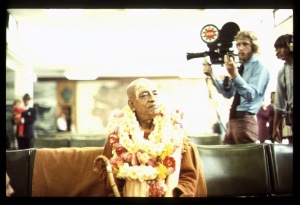CC Antya 1.145

A.C. Bhaktivedanta Swami Prabhupada
TEXT 145
- agre vīkṣya śikhaṇḍa-khaṇḍam acirād utkampam ālambate
- guñjānāṁ ca vilokanān muhur asau sāsraṁ parikrośati
- no jāne janayann apūrva-naṭana-krīḍā-camatkāritāṁ
- bālāyāḥ kila citta-bhūmim aviśat ko ‘yaṁ navīna-grahaḥ
SYNONYMS
agre—in front; vīkṣya—seeing; śikhaṇḍa-khaṇḍam—some peacock feathers; acirāt—all of a sudden; utkampam—trembling of the heart and body; ālambate—takes to; guñjānām—of a garland of guñjā (small conchshells); ca—also; vilokanāt—by seeing; muhuḥ—constantly; asau—She; sa-asram—with tears; parikrośati—goes around crying; na u—not; jāne—I know; janayan—awakening; apūrva-naṭana—like unheard-of dramatic dancing; krīḍā—of activities; camatkāritām—the madness; bālāyāḥ—of this poor girl; kila—certainly; citta-bhūmim—within the heart; aviśat—has entered; kaḥ—what; ayam—this; navīna-grahaḥ—new ecstatic influence.
TRANSLATION
" 'Upon seeing peacock feathers in front of Her, this girl suddenly begins trembling. When She sometimes sees a necklace of guñjā [small conchshells], She sheds tears and cries loudly. I do not know what kind of new ecstatic influence has entered the heart of this poor girl. It has imbued Her with the dancing attitude of a player creating wonderful, unprecedented dances on a stage.'
PURPORT
This verse (Vidagdha-mādhava 2.15) is spoken by Mukharā, a friend of Lord Kṛṣṇa’s grandmother, in a conversation with Paurṇamāsī, the grandmother of Madhumaṅgala.